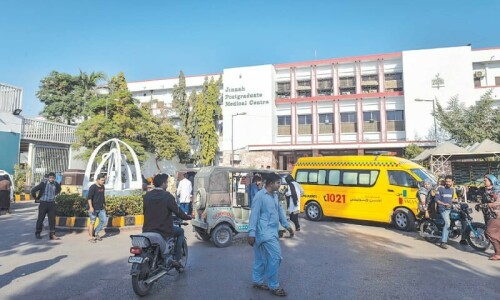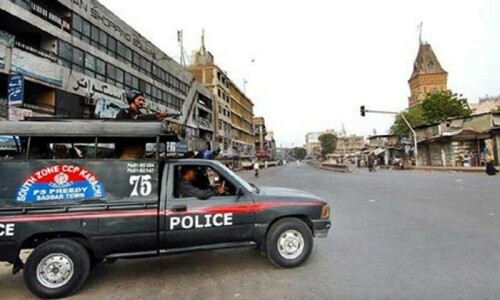KARACHI, Nov 23: Customs officials seized on Thursday seven falcons of an endangered species that were to be smuggled to Bahrain through Karachi airport, said a customs official on Friday evening.
Responding to Dawn queries, assistant collector of customs Rana Aftab posted at the airport said the smugglers were trying to use a re-export permit issued by the foreign ministry to a Bahrain dignitary but customs staff caught the culprits and seized the falcons.
Conservationists have been clamouring that re-export permits were widely misused and now this incident had proved that at least some of the permits were certainly misused and further checks were needed to counter the smuggling out of the precious birds by royal dignitaries.
The customs official said the seven falcons were being flown to Bahrain by Yousuf Ahmed Hujair, traveling to the Gulf state on a Bahraini passport (No 1678897) on Thursday.
He said the same number of falcons had been brought into the country from Bahrain on Wednesday by the passenger and he was taking them back the very next day, which raised suspicions. Close checks of the bids revealed that the falcons had been changed – they were not the birds brought into the country just a day earlier.
Explaining the import/ export procedure relating to falcons, he said the foreign ministry had issued re-export permits to various dignitaries and members of royal families of different Gulf states to facilitate their annual houbara hunting safaris so that these dignitaries could bring in their own falcons and after hunting houbara bustards take them back to their countries.
The customs official said that at the time of import customs staffers had taken photographs and measurements of the falcons and noted various other details and then at the time of returning the customs staffers again cross-checked the measurements and the photographs with the birds to see if the same birds were being taken out of the country which were brought in.
He said the first thing unusual noted by the customs was that these falcons were being taken back within a day – they were brought in on Nov 21 and were being taken back on Nov 22 – and then when the measurements were taken they were found different from the ones taken at the time of their arrival. These birds also did not match the photographs of the birds taken on their arrival a day earlier.
Besides, the birds that were brought in were older than the birds being taken out. The difference was very obvious. So the birds were detained.
The deputy consul general of Bahrain came to the airport on Friday and was sitting during the hearing of the case. He was informed of the decision of the confiscation of the birds and he had accepted the customs decision, said Rana Aftab, adding that the diplomat had requested that the name of the dignitary, whose re-export permit was used, not be revealed.
The sources said the federal government had issued at least five special houbara hunting permits to five royal family members of Bahrain, so this dignitary who was trying to smuggle out the falcons was most probably one of them. The names of the permit holders are: Sheikh Ebrahim bin Hamad bin Abdullah al-Khalifa, an uncle of the king of Bahrain; the King’s defence affairs’ adviser Sheikh Abdullah bin Salman Al-Khalifa; Sheikh Ahmed bin Ali Al-Khalifa, a member of the ruling family; the commander in chief of the Bahrain defence forces, Marshal Sheikh Khalifa bin Ahmed Al-Khalifa, and Sheikh Mohammad bin Hamad Al-Khalifa, a member of the ruling family.
Conservationists have time and again been demanding that the government introduce certain additional conditions in the falcon re-export permits, such as the birds be allowed to travel with the permit-holder only; and that the falcons be implanted with microchips so that customs officials could easily detect the discrepancies in data. Currently the falcons travel on passports or some of the birds have rings, but they are obsolete identification devices which could be easily manipulated. So the condition of a relatively recent device of microchip implantation be made mandatory, so that the migratory falcon population in the country could be protected.
Residents of colder central Asian regions, these falcons migrate southwards to the subcontinent to spend their winters in a relatively warmer environment here every year. These predatory birds are widely caught by local poachers and sold to Arab hunters. The widespread poaching of falcons and hunting of houbara bustards was affecting the population of both these migratory bird species.













































Dear visitor, the comments section is undergoing an overhaul and will return soon.